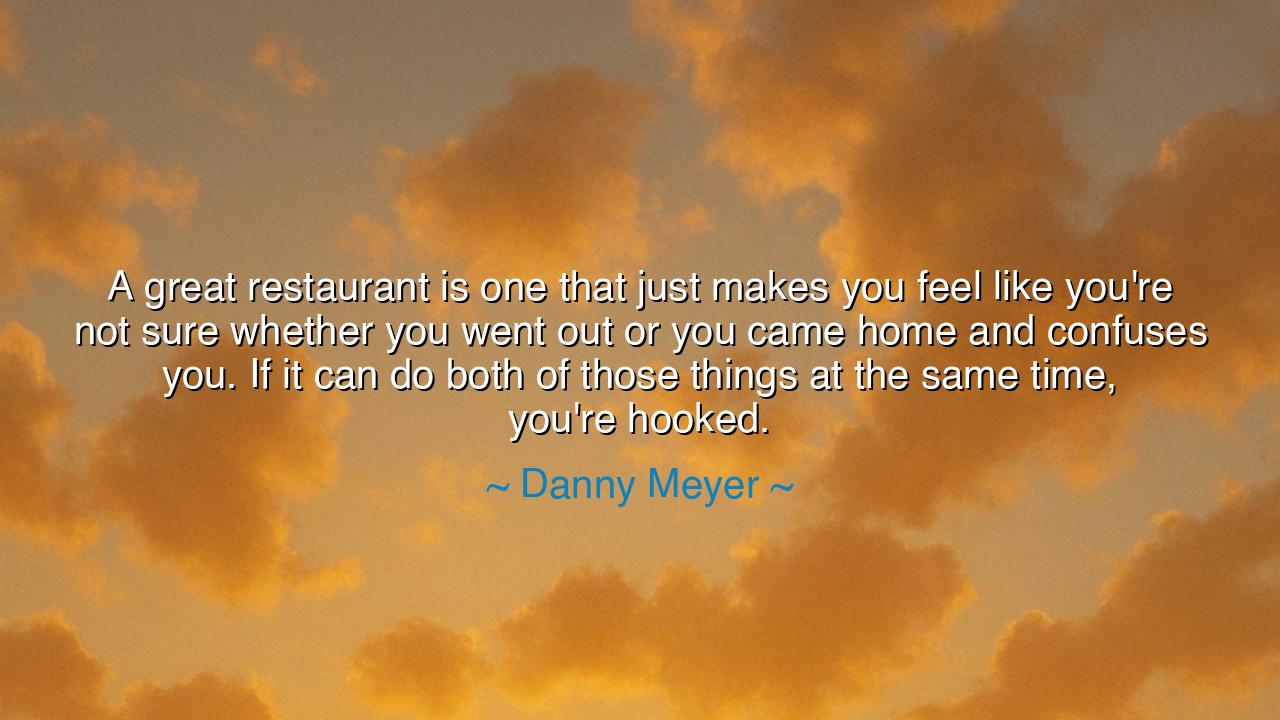
A great restaurant is one that just makes you feel like you're
A great restaurant is one that just makes you feel like you're not sure whether you went out or you came home and confuses you. If it can do both of those things at the same time, you're hooked.






In the warm and profound words of Danny Meyer, “A great restaurant is one that just makes you feel like you're not sure whether you went out or you came home and confuses you. If it can do both of those things at the same time, you're hooked,” we find a truth that extends far beyond the world of dining. These words speak not merely of food, but of the human longing for belonging and wonder—for comfort and discovery interwoven. Meyer, a master of hospitality, captures the rare magic of places that feel both familiar and extraordinary. Such a place, he tells us, holds the power to unite two opposites: the excitement of stepping into the unknown and the peace of returning to what feels like home.
The meaning of this quote lies in that delicate balance between warmth and adventure. To “go out” is to seek—the thrill of something new, the joy of surprise, the flavor of life beyond our walls. To “come home,” by contrast, is to rest—to return to the known, the trusted, the safe. A great restaurant, Meyer suggests, harmonizes these two instincts within us. It makes us feel alive, yet at ease; it offers novelty without alienation. When we walk through its doors, we are greeted as guests but treated as family. The air hums with energy, yet the experience settles our hearts. This is the art of true hospitality—not just to feed the body, but to nourish the soul with both familiarity and delight.
In these words, Meyer reveals a wisdom that the ancients would have understood well. The Greeks spoke of xenia, the sacred duty of hospitality, in which the stranger and the guest were treated as messengers of the gods. In Homer’s Odyssey, when weary Odysseus finds shelter in the halls of Alcinous, he is bathed, fed, and honored, though none know his name. It is this very balance that Meyer describes: the strangeness of the traveler met with the warmth of home. True hospitality, in every age, transforms distance into connection and difference into kinship. To make a guest feel both discovered and remembered is to partake in something divine—the bridging of hearts.
Consider the story of Alice Waters, the visionary founder of Chez Panisse in Berkeley. Her restaurant, like Meyer’s ideal, blurred the line between home and the wider world. Diners stepped into a space where the aroma of fresh herbs and wood smoke evoked the intimacy of a family kitchen, yet each plate carried the artistry of exploration—a journey through the fields, farms, and seasons of the land. It was not simply a place to eat; it was a place to feel, to be both comforted and awakened. Waters, like Meyer, understood that the true measure of hospitality lies not in grandeur but in authenticity—the gentle confusion of feeling utterly at home in a place you have never been before.
But there is a deeper lesson still. What Meyer calls “confusion” is, in truth, harmony—the meeting point of comfort and surprise, tradition and creativity, service and soul. In every craft, not just in the realm of food, greatness lies in achieving this balance. A teacher, a leader, an artist—all must learn this same art: to challenge without overwhelming, to welcome without dullness. The wise know that joy is born in this tension, where the heart feels both safe and stirred. As Meyer’s restaurants embody this balance in hospitality, so too should our own lives strive for it in our relationships, our work, and our service to others.
The origin of this wisdom comes from Meyer’s lifelong devotion to the philosophy of “enlightened hospitality,” a way of serving that prioritizes genuine care above mere transaction. His success was never built solely on the excellence of cuisine, but on the emotional architecture of experience—the unseen structure that makes people feel valued, respected, and at peace. To him, every meal shared is an act of community, every table a microcosm of humanity’s need for connection. Thus, his words transcend the dining room: they are a meditation on the human heart’s desire for belonging amid novelty, for recognition amid change.
So, dear listener, let this be your lesson: strive to create spaces—whether in your home, your work, or your spirit—that hold this same alchemy of warmth and wonder. When you welcome others, do so with sincerity. When you create, let your work reflect both familiarity and freshness. Make those around you feel that they have arrived, even when they are venturing into new ground. The greatest places, and the greatest people, are those who dissolve the boundaries between comfort and inspiration—who make us feel both at home in the world and more alive within it.
For as Danny Meyer teaches, the power of a great restaurant—or a great life—is not in its perfection, but in its paradox. It is in the laughter that feels both new and remembered, in the flavors that awaken nostalgia and discovery in the same breath. To live this way is to become both host and guest in the world’s vast table—to make others feel that in your presence, they have neither gone out nor come home, but somehow, wondrously, done both.






AAdministratorAdministrator
Welcome, honored guests. Please leave a comment, we will respond soon